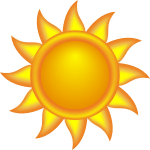
It sounds like last month was the sunniest March in over a decade, according to this article on Vísir. There are several sun and weather related terms in the article, and it also provides a good opportunity to mention one of the more interesting (or challenging) aspects of Icelandic – compound words. Now if your native language is English, compound words are nothing new. But they are probably more common in Icelandic and you might not recognize them right away if you are just starting out. If you speak German you probably have no problems whatsoever 🙂
The title of the article contains two compound words:
“Sólríkasti marsmánuður í yfir áratug” – Sunniest March In Over A Decade
The word for sunny combines the word for sun (sól) with the adjective for rich (ríkur). Then “the month of march” is expressed as one word – mars·mánuður. You could replace March with any other month and use it similarly.
“Marsmánuður hefur ekki verið eins sólríkur í Reykjavík síðan 1999 eða í fjórtán ár. Sólarstundir voru tæplega 163 og er það 51 stund yfir meðallag.”
“March hasn’t been so sunny in Reykjavik since 1999, or in 14 years. There were almost 163 hours of sunshine, or 51 above the average.”
The word used for measuring is að mæla:
| að mæla – to measure | ||
|---|---|---|
| present | past | |
| ég | mæli | mældi |
| þú | mælir | mældir |
| það | mæli | mældi |
| við | mælum | mældum |
| þið | mælið | mælduð |
| þau | mæla | mældu |
“Úrkoma í Reykjavík mældist rúmur 41 millimetri og er það um helmingur meðalúrkomu í mars. Síðast var mars ámóta þurr 2005.”
“Precipitation in Reykjavik was measured at around 41 millimeters and is about half of the average for March. The last time March was this dry was 2005.”
Be careful not to confuse að mæla with the verb that looks the same but means to talk or speak – they conjugate the same way in the present tense, but the past tense has -t- endings instead of -d-. It’s usually pretty clear from the context which meaning is intended.
Another word used in the article is sólskinsstund, which I guess is a triple compound 🙂 It contains the words for sun (sól), shine (skin) and time (stund).
The verb for shine has an interesting conjugation:
| að skína – to shine | ||
|---|---|---|
| present | past | |
| ég | skín | skein |
| þú | skín | skeinst |
| það | skín | skein |
| við | skínum | skinum |
| þið | skínið | skinuð |
| þau | skína | skinu |
Sólin skín oftast á sumrin. – The sun shines the most in summer.
So if you come across a word that isn’t in the dictionary, look closely to see if it might be a compound word. Then break it apart and look up each word separately, and see if you can figure out the meaning of the compound.
ára·tug/ur m (-ar,-ir) decade úr·kom/a f (-u,-ur) precipitation tæp·lega adv hardly, barely rúm·lega adv more than, just over meðal·lag n (-s) average, mean helming/ur m (-s,-ar) half á·móta adv about as þurr adj (f þurr) dry
